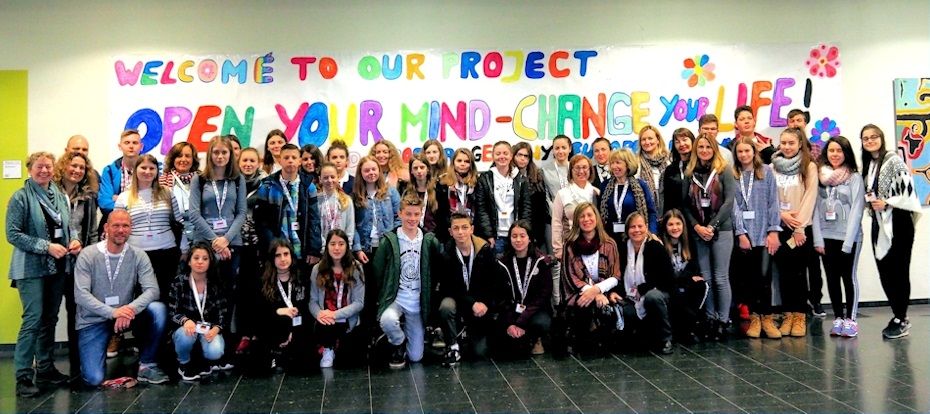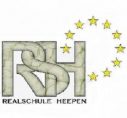
Startseite » Europa » Open your mind – change your life
Open your mind – change your life
Unser Projekt „Open your mind – change your life“ basiert auf den Bedürfnissen von Schüler/innen im Alter von 12-16 Jahren aus 5 verschiedenen Ländern: Kroatien, Polen, Portugal, Griechenland und Deutschland. Schulspezifische Themen, wie z.B. häufige Fehlzeiten und mangelndes Interesse an naturwissenschaftlichen Inhalten werden genauso aufgegriffen wie die schwierige Lebenssituation z.B. in Bezug auf die herannahende Berufswahl, mangelnde Fremdsprachenkenntnisse und die fehlende Motivation zum weiterführenden Lernen und Studieren und der damit verbundenen Qualifikation.
Die Erfahrungen der letzten Jahre haben gezeigt, dass die Motivation deutlich steigt, wenn in internationaler Kooperation schülerrelevante Themen gemeinsam erarbeitet und präsentiert werden. Hemmungen im Umgang mit Fremdsprachen werden ebenso reduziert wie die Vorurteile bezüglich fremder Länder und Kulturen. Das Aufzeigen von Möglichkeiten des europäischen Arbeitsmarktes helfen Schüler/innen beim Blick über den Tellerrand und helfen bei der Prävention in Bezug auf frühzeitigen Schulabbruch.
The project was created as a response to needs of students from five countries: Poland, Germany, Croatia, Greece and Portugal. The target group of our project includes students aged 12-16 who have a high rate of absences at school, problems with science, maths and whose key competences require improvement. We choose secondary school students as they are facing the most crucial decisions in their lives choosing their education and job careers. The coordinator school noticed those problems among its students and prepared and carried out an international survey for its partner schools from various countries – four of them had similar situation. That international survey was designed for students, teachers and asked about students‘ school and exam results, their achievements and expectations connected with education, motivation to study and future education and job plans. 250 students from all partner schools answered the survey. The teachers analysed the results and online conversations helped us to indicate the most important problems at our schools:
– underachievement in science and maths (both school results and national exams- according to surveys and exam reports)
– low motivation to study (according to surveys about 60% of students rank their motivation 2 – out of 5 ranks)
– the low percentage of students interested in science and maths (most of them claim they are too difficult and according to them those subject are not relevant to everyday life)
– low self-confidence (students rank their skills and abilities quite low)
– reading comprehension, scanning, writing skills (the analysis of students tests and exams showed they have problems to understand tasks, look for information, rationale and develop their opinions)
– low frequency of attendance at school classes and additional classes (mostly students who face underachievement do not attend school regularly – on the basics of the analysis of school registers)
– diffidence while self-presentation (Most of students claim they prefer to prepare a paperwork instead of a speech, most of interviewed claim that they have problems to organize their speech, to come up with smart ideas and sophisticated vocabulary. The survey presented 70% of all students unwillingly speak during classes and teachers claim students’ responses are not developed and complex – especially during foreign language classes)
– lacks in ICT skills and lack of confidence while using them (Some of students face problems with using ICT schools used at school and they do not know additional tools that can be used by them – even for their private purposes)
– applying knowledge into practice (Half of interviewed students has problems to use their knowledge and skills in practical situations – both science and language skills)
– difficulties in solve-problem thinking
Interviews with students shows that their ways of communication are simplified and undemanding which contributes to the development of functional literacy. Students communicate using simple vocabulary, messages, emoticons and they omit punctuation and orthography. As a consequence we noticed they have problems in a face to face conversation – they have problems to differentiate arguments, thesis and create complex statements both in mother and foreign languages. Students surrounded by new technologies are in danger of the limitation of their abilities and skills. Teachers admitted that there is not enough time for experiments, extra exercises and practical exercises during classes that is why the project will enable them to hold them.
Defining problems helped us to set the priorities and we agreed that those problems should be solved or leveled by an international project since as our previous experience showed students from all partner countries who are involved in an international project get high results in national exams (e.g. Polish school got 20% higher score than neighbourhooding schools after the project 3 years ago) and most of them decide to continue their education in high schools.
Throughout additional activities and classes we want to teach our students about practical usage of their school knowledge and skills and the fact that the project involves international cooperation makes them feel more responsible and motivated to work and attend classes. Throughout the project we aim at applying innovative and effective methods of teaching and learning to improve the effects of studying, get students interested in subject that seem to be demanding and too difficult, teach our students how to learn and prevent truancy and early school leaving. Our students are obliged by law to attend school yet, but we want them to continue their education and to notice its importance for their future jobs and lives. There is a need for well-qualified employees fluent in ICT and foreign language and we want our students to have satisfying jobs.
Kontakt
Realschule Heepen
Alter Postweg 33 | 33719 Bielefeld
Telefon 0521 – 55799670
Fax 0521 – 557 99 6715
E-Mail: realschule.heepen@bielefeld.de
